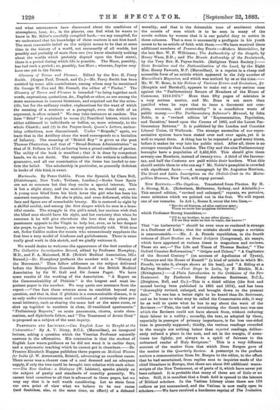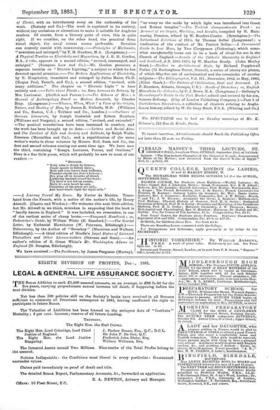NEW EDITIONS.—The Captives. Translated from Plautus. By H. A. Strong,
MA. (Robertson, Melbourne, Sydney, and Adelaide.)— This second edition, "revised and enlarged," repeats, we perceive, some mistakes which we pointed out in the first. We will repeat one of our remarks. In Act i., Scene 2, occur the two lines,— " Ego ibo ad fratrom, ad alios captinos meos : Vtsam no nocte hac quippiam tarbanorint," which Professor Strong translates,— "I'll to my brother, to my other slaves,— see they make no fuss to-night, the knaves !"
That "ne turbaverint " should be even once so rendered is strange in a Professor of Latin ; that the mistake should escape a revision is unaccountable—Mr. J. A. Fronde republishes, in the fourth volume of Short Studies on Great Subjects (Longmans), six essays, which have appeared at various times in magazines and reviews. These six are,—" The Life and Times of Thomas Becket," "The Oxford Counter-Reformation," " Origen and Celsus," "A Cagliostro of the Second Century" (an account of Apollonius of Tyana), " Cheneys and the House of Russell" (a kind of article in which Mr. Fronde, we take it, always shows at his best), and "A Siding at a Railway Station."—First Steps in Latin, by F. Ritchie, M.A. (Rivingtons.)—A Plain Introduction to the Criticism of the New Testament. By Frederick Henry Ambrose Scrivener, D.C.L. (Deighton, Bell, and Co.)—This is a third edition (the first and second having been published in 1861 and 1874), and has been "thoroughly revised, enlarged, and brought down to the present date." No one has a better right to be heard than Dr. Scrivener, and as he leans to what may be called the Conservative side, it may be as well to quote what he has to say about the work of the Revisers :—" First, the task of scrutinising the Greek text was one which the Revisers could not have shrunk from, without reducing their labour to a nullity ; secondly, the text, as adopted by them, especially in passages of primary importance, is far less one-sided than is generally supposed ; thirdly, the various readings recerded in the margin are nothing better than rejected readings, deliber- ately refused a place in the text, and set in the margin, if some- times too lightly, yet always in a spirit of fairness to the unlearned reader of Holy Scripture." This is a very different, account of the matter from that which Dean Bargon gave of the matter in the Quarterly Review. A postscript to the preface notices a communication from Dr. Bergen to the editor, to the effect that he had ascertained, from replies sent to inquiries made of the chief librarians in Europe, that there are about 300 additional mann- scripts of the New Testament, or of parts of it, which have never yet been collated. It is probable that many of these are of little or no value. Still, it is manifest that a fresh field is opened to the labours of 'Biblical scholars. In the Vatican Library alone there are 179 codices as yet unexamined, and the Vatican is now really open ta scholars.—We have received a handsome reprint of The Imitation. of Christ, with an introductory essay on the authorship of the work. (Sattaby and Co.)—The work is reprinted in its entirety,
without any omissions or alterations to make it suitable for Anglican readers. Of course, from a literary point of view, this is quite right. If we consider, on the other hand, the practical devo-
tional object, the usual coarse seems preferable. Devotion can scarcely coexist with controversy. —Principles of Mechanics, "rewritten and enlarged," by T. M. Goodeve, M.A. (Longmans.) — A Physical Treatise on Electricity and Magnetism, by J. E. H. Gordon, B.A., 2 vols., appears in a second edition, "revised, rearranged, and enlarged." (Sampson Low and Co.)—Mr. Gordon promises a separate treatise on "Electric Lighting," a subject to which he has devoted special attention.—The Modern Applications of Electricity, by E. Hospitaller, translated and enlarged by Julius Maier, Ph.D. (Kogan Paul, Trench, and Co.), a second edition, "revised, with many additions." The chapter on " Electric Light " is here entirely new.—Talks about Plants ; or, Easy Lessons in Botany, by Mrs. Lankester. (Griffith and Farran.)—The Science of Man : a Manual of Anthropology Based on Modern Research, by Charles Bray. (Longmans.)—Whence, When, What ? a Vieto of the Origin, Nature, and Destiny of Man, by James R. Nicholls, M.D. (Williams and Co., Boston, U.S.; Trilbner and Co , London.) —Outlines of German Literature, by Joseph Gostwick and Robert Harrison (Williams and Norgate), a second edition, "revised, and extended." —The poetical translations have been increased in number, and the work has been brought up to date.—Letters and Social Aims and The Conduct of Life and Society and Solitude, by Ralph Waldo Emerson (Macmillan and Co.) ; and a republication of the same writer's works in three volumes by Messrs. Bell, Sons, and Co., the first and second volumes coming out some time ago. We have now the third, containing "Essays, Lectures, Poems, and Orations." Here is a fine little poem, which will probably be new to most of our readers :--
" HE/tong.
"Ruby wine is drunk by knaves, Sugar spends to fatten ,lave, Rose and vino leaves deck buffoons, Thunder-clouds are Jove's festoons ; Dro ping oft in wreaths of dread, Lightning knotted round his bead, The hero is not fed on sweets, Daily la's own heart he eats. Chambers of the great are jails. And head-winds right for royal sails."
—..I Journey Round My Room. By Xavier de Maistre. Trans- lated from the French, with a notice of the author's life, by Henry Attwell. (Ghetto and Windus.)—We welcome this neat little edition, but Mr. Attwell is, we think, mistaken in supposing that the book is ." hardly known in England." It was included, we remember, in one of the earliest series of cheap books.—Knapsack Handbook ; or, Pedestrian's Guide, by William White (E. Stanford.)—The Scarlet Letter, by Nathaniel Hawthorne (W. Paterson, Edinburgh.)— Tobersnorey, by the Author of " Stronbuy " (Macniven and Wallace, Edinburgh).—A third edition of Hindle's Legal Status of Licensed Victuallers and Other Licence-holders (Stevens and Sons).—An author's edition of R. Grant White's Mr. Washington Adams in England (D. Douglas, Edinburgh).
We have received :—The Parthenon, by James Ferguson (Murray), "an essay on the mode by which light was introduced into Greek and Roman temples."—The Turkish Compassionate Fund : an Account of its Origin, Working, and Results, compiled by H. Main- waring Danston, edited by W. Burdett-Coutts. (Remington.)—The Sutherland Evictions of 1814, by Thomas Seller (Longmans); a vindication of the conduct of Mr. Patrick Sellar.—.4 Ceremonial Guide to Low Mass, by Two Clergymen (Pickering), which some- what unexriectedly turns out to be a book of ritual for use in the Church of England.—Annals of the Catholic Hierarchy in England and Scotland, A.D. 1585-1876, by W. Maniere Brady. (John Mozley Stark.)—Studies in Architectural Style, by Richard Popplewell Pullen (15 Buckingham Street, Strand), a series of ninety-six plates, of which fifty-five are of ecclesiastical and the remainder of secular subjects.—The Bibliographer, Vol. III., December, 1882, to May, 1883, (Elliot Stock.)—The Factors of Civilisation, Real and Assumed. (J. P. Harrison, Atlanta, Georgia, U.S.)—Bonds of Disunion ; or, English Misrule in the Colonies, by C. J. Rowe, ILA. (Longmans.)—Bellamy's Housekeeper's Guide to the Fish Market, edited and revised by his son, Somers Bellamy. (City of London Publishing Company.)—Part 1 of Cartularium Saxonicum, a collection of charters relating to Anglo- Saxon history, edited by W. De Gray Birch, F.S.A. (Whiting and Co.)



































 Previous page
Previous page